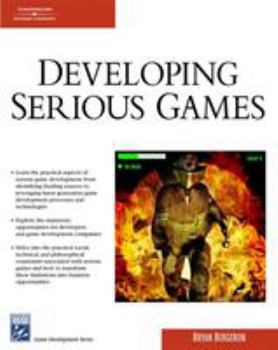Developing Serious Games
This text details what is involved in developing serious video games, from the use of affordable game engines to marketing and identifying sources of capital. It is designed as a resource for... This description may be from another edition of this product.
Format:Paperback
Language:English
ISBN:1584504447
ISBN13:9781584504443
Release Date:January 2006
Publisher:Charles River Media
Length:452 Pages
Weight:1.75 lbs.
Dimensions:1.0" x 7.4" x 9.2"
Customer Reviews
4 ratings
Military, academic, medical, training and more games!
Published by Thriftbooks.com User , 18 years ago
Bergeron's DEVELOPING SERIOUS GAMES provides game developers with a practical manual exploring serious games: military, academic, medical and training games, to be specific. With the wealth of titles focusing on pleasure games, it's good to see a developer's guide which explains business concepts, tools which can be applied to real-world challenges and concepts, and discusses major differences between entertainment and educational gaming. Students and developers alike will find it a fine practical 'how-to' guide teaching concepts ranging from locating funding sources for such games to choosing game shells and marketing finished products.
Serious games must be taken seriously!
Published by Thriftbooks.com User , 18 years ago
This is a very good book on serious games. It does give you probably up to a hundred examples of serious games on various fields such as the military, medical training games, educational games, simulations, etcetera. In the book serious games are categorised as: Activism Games, Advergames, Business games, Exergaming, Health and medicine games, News games, Political games, Realistic games, Core competency games, Repurposed of the shelf games and Mods. Within all these lots of examples are given that give designers examples. Unfortunately these examples are not really analysed in detail so the reader has to make up his mind if the given example is a good practise of a serious game or not. The book does give some basic ideas on what makes a serious game a good practise and gives lost of references for further study on particular serious game design issues. It does give an introduction into the development process of (serious) games, technologies, (project) management and business aspects. I could care less for this part and on a occasion or two I found the book (in my opinion) wrong. For example the game development process is being described as a `pipeline' process, thus being linear. However good games, serious or not, need to be tested and tested and tested by players and thus redesigned and redesigned and redesigned many times. You can not do that in a linear managed project, where you go from fase to fase! I have never seen it work in practice. This is what happens if a museum, institute or school wants to make a serious game and does it in a linear way: they have an idea, they design the game, they make it and then when almost all the money is gone, they have it tested by some kids only to find out it is a boring game and that it needs to be redone all over. Back to the design fase! They did manage their money well throughout all the fases, but they never realised they needed to go trough the idea and design fase up to 10 times! For this reason and others the use of MS projects as proposed in the book is a bad suggestion. MS projects is ok if you manage a construction project, not good for software development. But the use of MS projects in software development (and thus game projects) is another story. Another part of the book is about the hardware and software you could use to make a serious game. The suggestions on software and the lists of examples is very good (even though there is lots more software available to make (serious) games. E.g. have a look at gamesmaken.startpagina.nl. The remarks on hardware, could be left out. It lists what kind of PC configuration you would need to make a serious game. Ok if you are a total beginner in this field, but for the 98% of the other readers it does not make much sense. This list will be outdated at the time the book has left the presses. Also, there is always so much debate on which hardware to use. The book for example suggests a pc configuration for sound recording. Now, I do not want to get
Gaming Techniques to Teach Lessons
Published by Thriftbooks.com User , 18 years ago
Serious games is an interesting offshoot of the standard gaming industry. While most of the characteristics of the games have to be the same as 'play' games the key to a serious game is that it imparts 'a skill, knowledge or attitude that can be applied in the real world.' When the hijackers who were to crash their planes into the World Trade Center wanted to learn to fly, they used simulators. These very expensive devices move the 'game player' around in three-D to impart muscle memory to the player. Other less serious games can't quite do that, but they can still impart a lot of knowledge about how to fly a plane (microsoft flight simulator), drive a car, or drive a tank. This book presents a fairly high level overview of the serious game business. It talks about the general concepts of things like marketing (quite different than what's needed for space blasters), costs, marketing and so on. It then covers the basic techniques for game development including the specialized software that has been developed to facilitate the software development.
Worth a wait.
Published by Thriftbooks.com User , 18 years ago
I've been waiting for a book on serious games long time. This is just what I was looking for. I can see the author has put a lot of energy into this work. Well-written and well-researched. Also it comes with good reference. I particulary like serious game development templates. A definite keeper for my bookshelf! I recommend it.





